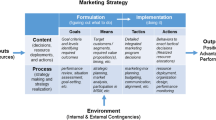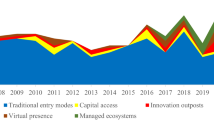Abstract
Rejection of the market economy is widespread in academia. This fact has often been observed, but rarely explained. Using a large survey on French academics which replicates questions used in international surveys, this article confirms that French academics are hostile to market economy principles in comparison with the French population. Two explanations are tested: the first posits that academics—as knowledge providers—are likely to experience a “public good” market failure. Their rejection of the market economy is thus linked to their specific positioning vis-à-vis the market economy itself. The second hypothesis assumes that academics are not involved in market activities. Consequently, this lack of familiarity leads academics to be more suspicious towards an institution they barely experience. Both hypotheses are consistent with our data.





Similar content being viewed by others
Notes
In fact, it has been several times suggested—in France see Boudon (2004), for example—but it has been never empirically tested.
This is remarkable that the individual data provide measure about direct and indirect income from scientific activities, whereas the aggregated data by fields only offer measure about the direct income.
The National Council of Universities (Conseil National des Universités, CNU) is an administrative national elected institution which organizes the university system at national level.
The European Values Study is an international survey that takes place every 9 years. In 2008, it contained 3,071 responses for France. For more details, see http://www.europeanvaluesstudy.eu/evs/surveys/survey-2008.html.
Except for the first question, the others are only included in the French part of the 2008 EVS, which means the three other questions are not displayed in the rest of the nations involved in the EVS.
The fields are identified following usual distinction and are detailed in Fig. 5.
This is the cluster correction method; for details, see Cameron and Trivedi (2005).
This outcome does not depend on the simultaneous introduction of the two variables within the model since if we drop one of those from the estimate, the outcome does not change.
The variable is detailed in appendix table where the linguistics is the most Marxist discipline, whereas the other social science that includes theology is the least according to this measure.
Given the small proportion of respondents choosing the market solution to the question (3 per cent), we also carry out a complementary log–log regression. The results are quite similar to those with the standard logit. The detailed outcomes can be obtained upon request.
References
Allport, G.W. 1954. The Nature of Prejudice. Cambridge, MA: Addison-Wesley.
Aron, R. 1955. L’Opium des intellectuels. Paris: Calmann-Lévy.
Bell, D. 1976. The Cultural Contradictions of Capitalism. New York: Basic Books.
Berggren, N, H Jordahl, and ad C Stern. 2007. The political opinions of swedish social scientists. Working Paper, IFN, vol. 711.
Boudon, R. 2004. Pourquoi les intellectuels n’aiment pas le libéralisme. Paris: Odile Jacob.
Brint, S. 1985. The political attitudes of professionals. Annual Review of Sociology 11: 389–414.
Brym, R., and R. Nekhaie. 1999. The political attitudes of Canadian professors. Canadian Journal of Sociology 24(3): 329–353.
Cameron, C.A., and P.K. Trivedi. 2005. Microeconometrics: Methods and Applications. New York: Cambridge University Press.
Caute, D. 1964. Communism and the French Intellectuals. New York: Macmillan.
Cipriani, G.P., D. Lubian, and A. Zago. 2009. Natural born economists? Journal of Economic Psychology 30: 455–468.
Fox, C.R., and A. Tversky. 1995. Ambiguity aversion and comparative ignorance. The Quarterly Journal of Economics 110: 585–603.
François A. 2013. Les Européens et l’économie de marché. Futurible, juillet-août 2013.
François, A., C. Le Gall, and R. Magni-Berton. 2016. Politics, economics, ethics, and religion in French academia. French Politics 14: 363–379.
François, A., and R. Magni-Berton. 2015. Que pensent les penseurs?. PUG: Grenoble.
Frey, B.S., and W.W. Pommerehne. 1993. On the fairness of pricing: An empirical survey among the general population. Journal of Economic Behavior & Organization 20: 295–307.
Goossens, A., P.-G. Méon. 2010. This is an economist’s argument! The impact of studying economics and other disciplines on the belief that market transactions make everyone better off. Working paper 10-012 (Brussels, Belgium: Université libre de Bruxelles, Centre Emile Bernheim).
Gross, N., and C. Cheng. 2011. Explaining professors’ politics: an indirect test of the self-selection hypothesis. In Diversity in American Higher Education, ed. Lisa Stulberg and Sharon Weinberg. London: Routledge.
Gross, N., and Simmons, S. 2007. The social and political views of American professors, Working Paper, Department of Sociology, Harvard University.
Gross, Neil. 2013. Why Are Professors Liberal and Why Do Conservatives Care?. Cambridge MA: Harvard University Press.
Halsey, A.-H., and M. Trow. 1971. The British Academics. London: Faber & Faber.
Haucap, J., and T. Just. 2010. Not guilty? Another look at the nature and nurture of economics students. European Journal of Law and Economics 29(2): 239–254.
Judt, T. 1992. Past Imperfect: French Intellectuals 1944–1956. California: University of California Press.
Kahneman, D., J.L. Knetsch, and R. Thaler. 1986. Fairness as a constraint on profit seeking: Entitlements in the market. American Economic Review 76(4): 728–741.
Klein, D., and C. Stern. 2005. Professors and their politics: The policy views of social scientists. Critical Review 17: 257–303.
Kurzman, C., and L. Owens. 2002. The sociology of intellectuals. Annual Review of Sociology 28: 63–90.
Ladd, E., and S. Lipset. 1976. The Divided Academy: Professors and Politics. Toronto: McGraw-Hill.
Lamont, M. 1987. Cultural capital and the liberal political attitudes of professionals: Comment on Brint. American Journal of Sociology 92: 1501–1506.
Lamont, M. 1992. Money, Morals, and Manners: The Culture of the French and American Upper-Middle Class. Chicago: University of Chicago Press.
Lazarsfeld, P., and W. Thielens. 1958. The Academic Mind. New York: Free Press.
Leymarie, M., and J.P. Sirinelli. 2003. Histoire des Intellectuels d’Aujourd’hui. Paris: Presses Universitaires de France.
Nekhaie, R., and B. Adam. 2008. Political affiliation of Canadian professors. Canadian Journal of Sociology 33(4): 873.
Nozick, R. 1997. Why do academics oppose capitalism? In Socratic Puzzles, ed. R. Nozick. Cambridge: Harvard University Press.
Rios, D., and R. Magni-Berton. 2003. La Misère des Intellectuels. Paris: L’Harmattan.
Rojas, F. 2007. From Black Power to Black Studies: How a Radical Social Movement Became an Academic Discipline. Baltimore: The Johns Hopkins University Press.
Rothman, S., Lichter, R. 2008. Politics and professional advancement among college faculty. The Forum 3.
Rothman, S., M. Woessner, and A. Kelly-Woessner. 2010. The Still Divided Academy: How Competing Visions of Power, Politics, and Diversity Complicate the Mission of Higher Education. Lanham, MD: Rowman & Littlefield.
Siroen, J. 2009. Comment l’opinion perçoit la mondialisation: une exception française? Working Paper Université Paris-Dauphine.
Stiglitz, J.E. 1999. Knowledge as a global public good. In Global Public Goods: International Cooperation in the 21st Century, ed. Inge Kaul, Isabelle Grunberg, and Marc A. Stern. New York: Oxford University Press.
Zipp, J., and R. Fenwick. 2006. Is the academy a liberal hegemony? The Political Orientations and Educational Values of Professors, Public Opinion Quarterly 70: 304–326.
Acknowledgements
The authors would thank Nicolas Eber, Nicolas Sauger and Pierre Bréchon for their help on the survey design and Pierre-Guillaume Méon for fruitful discussion. Any errors remain ours.
Author information
Authors and Affiliations
Corresponding author
Additional information
Publisher's Note
Springer Nature remains neutral with regard to jurisdictional claims in published maps and institutional affiliations.
Rights and permissions
About this article
Cite this article
François, A., Le Gall, C. & Magni Berton, R. Why do academics oppose the market economy? Sophistication and perception of market failures. Fr Polit 17, 228–256 (2019). https://doi.org/10.1057/s41253-019-00088-4
Published:
Issue Date:
DOI: https://doi.org/10.1057/s41253-019-00088-4




